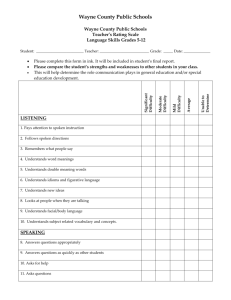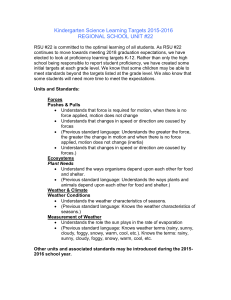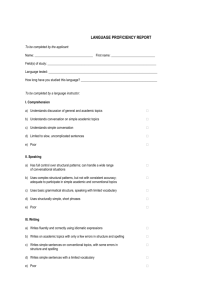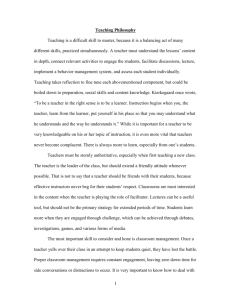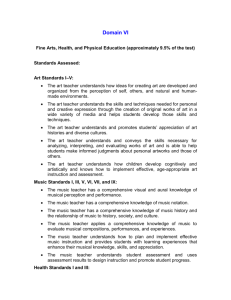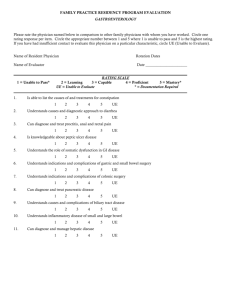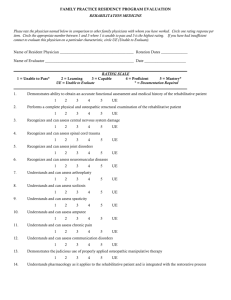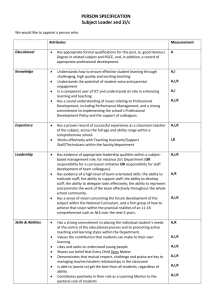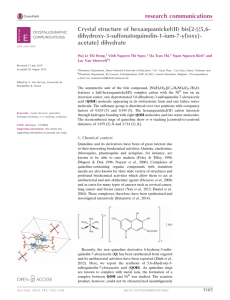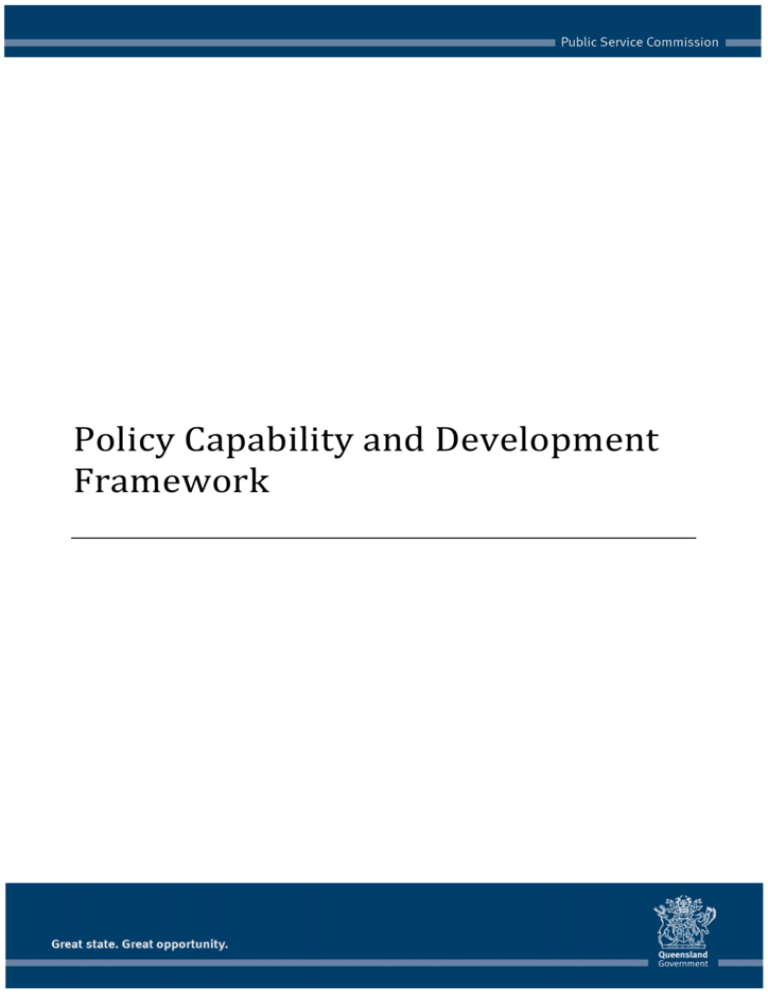
Policy Capability and Development Framework Copyright Statement PSC Statement Copyright © 1992, 1996, 2001‐2003 Lominger Limited. Inc., a subsidiary of Korn/Ferry International. ALL RIGHTS RESERVED. This work is derived from the LEADERSHIP ARCHITECT® Competency Sort Cards developed by Robert E. Eichinger and Michael M. Lombardo for Lominger Limited. Inc., a subsidiary of Korn/Ferry International. Without the prior written of Lominger Limited. Inc., no part of this work may be used, reproduced, or transmitted in any form or by any means, by or to any party outside of the State of Queensland. Policy Capability and Development Framework 2 Contents Building Policy Capability in the Queensland Public Service (QPS)................................................................................... 4 The Framework ................................................................................................................................................................. 5 Further information .......................................................................................................................................................... 5 1. Analytical ability ............................................................................................................................................................ 6 2. Communication ............................................................................................................................................................. 8 3. Public policy process ................................................................................................................................................... 10 4. Strategic Engagement ................................................................................................................................................. 11 5. Leadership and management competencies for policy officers (Based on the Lominger Leadership Architect®) .... 12 Policy Capability and Development Framework 3 Building Policy Capability in the Queensland Public Service (QPS) Policy officers in the QPS play a key role in ensuring that the agenda of the ‘government of the day’ is delivered in a measured and sustainable way as well as developing and delivering strategic policy (which looks to the long term future). Skill shortages in policy roles is well known across the sector, indeed enhancing policy capability was identified by the Australian Public Service as one of the signature reforms for a high performing public sector1. Generally speaking, QPS policy officers have learnt their skills and gained experience on‐the‐job and have progressed professionally as these skills developed. There are also policy officers who join the QPS later in their careers bringing with them a broad range of knowledge and expertise from either other government jurisdictions, or the private sector. Also, policy roles themselves can be quite different across the sector in relation to both purpose and outcomes. As a result, there is an eclectic range of policy officers and roles across the QPS, resulting in a diverse range of experiences and perspectives on different issues. Over recent years policy capability development in the QPS has been met in the following ways: o
o
o
sponsoring senior leaders to participate in the ANZSOG Executive Masters in Public Administration program employees self‐nominating for the Graduate Certificate in Policy Analysis offered by Griffith University (and potentially supported by SARAS) Public Service Commission (PSC) coordination of a whole‐of‐Government policy graduate program as well as departmental graduate programs with policy‐focussed positions. In March 2010, PSC and the Department of the Premier and Cabinet identified policy capability development as a priority across the QPS. The Commission Chief Executive presented a strategy to the Chief Executive Officer Leadership Team (CLT) and the Policy Capability Development Taskforce (PCDT) comprising senior policy leaders from each department. The PCDT convened six times between April and November 2010. The group’s purpose was to develop a whole‐of‐
Government policy capability development framework through: o
o
o
o
identifying whole of government policy capability issues and priorities seeking innovative solutions to policy capability issues and progress initiatives creating an environment for strategic discussion at a whole‐of‐Government level sharing knowledge of best practice in policy capability development. The PCDT agreed that policy roles can be specialised in that they serve the industry and stakeholders relevant to their department’s responsibilities, however, there are core policy competencies that are transferable across the service regardless of the topic the policy relates to. The resulting framework provides a common language and helps define the skills, knowledge and abilities we value in a policy career and covers technical, leadership and management competencies. The Policy Capability and Development Framework (the Framework) provides the opportunity to encourage staff in delivery roles to transition to policy roles as priorities shift. 1
Advisory Group on Reform of Australian Government Administration (2010) Ahead of the Game: Blueprint for the Reform of Australian Government Administration Policy Capability and Development Framework 4 The Framework The PCDT identified four policy ‘technical’ capabilities. These are: 1.
2.
3.
4.
Analytical ability Communication Public policy processes Strategic engagement. These capabilities were categorised and tailored for the following groups of policy officers: o
o
o
o
AO3 and AO4 (including graduates) AO5 and AO6 AO7 and AO8 SO and above. The Framework also includes the leadership and management capabilities required for policy officers at each of these levels. These were based on policy capability development undertaken by the Department of Employment, Economic Development and Innovation (formerly Mines and Energy). The capabilities are based on the Lominger Leadership Architect® competencies (under licence). A full copy of the Framework can be found at: www.psc.qld.gov.au. Further information For more information in relation to this Framework or the Capability and Leadership Framework, refer to the Public Service Commission website or contact ld@psc.qld.gov.au.
Policy Capability and Development Framework 5 1. Analytical ability 1.1 1 2
3
4
Grads Mid Seniors Executive level AO3 to AO4 AO5 to AO6 AO7 to AO8 SO and above a. Undertakes literature d. Analyses information searches and collate the gathered from a variety of results as relevant to policy. sources (e.g. literature reviews) g. Reviews reports on literature reviews and identifies applications for the policy program in question. i. Applies a whole‐of‐
government perspective and multi‐disciplinary approach to identifying research and policy implications. b. Knows which information sources to access: eg. agency data, published research, media e. Distils the key issues
h. Identifies appropriate information sources and guides staff in undertaking research j. Distils complex information and reframes the information appropriately for the audience c. Undertakes cross‐
jurisdiction policy analysis f. Accesses appropriate information sources k. Identifies new information sources. l. Builds links, networks and collaborates with the broader policy community (e.g. policy officers in other departments, and people in think tanks, research institutions, the community sector, stakeholders) Policy Capability and Development Framework 6 1. Analytical ability contd… 1.2 1 2
3
4
Grads Mid Seniors Executive level AO3 to AO4 AO5 to AO6 AO7 to AO8 SO and above a. Evaluates the integrity and comparability of data, and identifies gaps in data sources b. Interprets and analyses h. Defines criteria for the meaning of information, selecting among proposed options gathered from a variety of sources, for the current policy agenda f. Interprets and analyses complex information for the current and future policy agenda c. Works with large scale statistical data sets i. Compares proposed solutions to one another and to the current, unchanged situation in response to the political context to provide compelling evidence on the proposed solution. n. Develops or alters a policy direction/agenda based on the best available evidence, including cost/benefit analysis and risk assessment. d. Analyses information and develops options using decision analysis methods (e.g. cost‐benefit, multi‐
criteria analyses, SWOT analyses, issues trees, etc), including risk assessment j. Analyses the underlying factors contributing to differences in policy positions and latest research. o. Thoroughly knows and understands the political, intergovernmental and inter‐jurisdictional priorities, and their potential impact on policy agenda e. Makes relevant inferences from quantitative and qualitative data. Identifies whether policy is consistent with research findings or raw data from within the Agency. k. Obtains and interprets information regarding risk and applies it to policy design p. Analyses long term trends; makes projections , predictions and scenario analyses; and identifies ‘over the horizon issues’ f. Discusses and presents findings in relevant research to senior staff and take responsibility for further appropriate analysis. l. Develops and foster innovative and creative ideas and policy solutions. g. Evaluates impact of implemented policy m. Evaluates the effect, impacts and outcomes of policy, and builds learnings from this into future policy development Policy Capability and Development Framework 7 2. Communication 2.1 1 2 3
4 Grads Mid Seniors Executive level AO3 to AO4 AO5 to AO6 AO7 to AO8 SO and above a. Develops contacts and networks, and builds relationships with appropriate internal and external stakeholders b. Maintains contacts and networks with appropriate internal and external stakeholders e. Works with internal i. Establishes productive working and external stakeholders relationships in situations where interests are competing and clients to agree on common goals or resolve particular issues c. Negotiates with internal stakeholders, and undertakes at‐level negotiations with stakeholders in other agencies f. Builds consensus for the j. Sets agendas and parameters for chosen course of action negotiation d. Collaborates with stakeholders to develop policy g. Collaborates and negotiates with stakeholders to develop policy. k. Able to commit the agency to a course of action and/or decide on a course of action on behalf of the agency h. Able to respond to emergent issues through establishing and maintaining appropriate networks l. Undertakes high level bargaining, seeks agreement and mandate from government m. Proactively manages conflict
Policy Capability and Development Framework 8 2. Communication contd… 2.2 1 2
3
4
Grads Mid Seniors Executive level AO3 to AO4 AO5 to AO6 AO7 to AO8 SO and above n. Writes in plain English and non‐emotive language, using correct grammar, punctuation and an appropriate style. s. Writes briefs and correspondence on non‐
contentious issues w. Writes and edits concise, accurate submissions, briefs and correspondence on contentious issues y. Sets agenda and direction for written material o. Collates and summarises information, collect evidence for input into briefs, and prepares meeting notes t. Understands the sensitivities of the target audience and tailors oral and written communication appropriately x. Anticipates the sensitivities and needs of the target audience and tailors oral and written communication appropriately z. Communicates policy proposals, policy decisions policy and research findings at a range of different forums. p. Tailors oral and written communication appropriately for the audience u. Actively listens and uses non‐verbal communication skills to encourage participation from others q. Uses communication skills v. Knows and uses such as listening, checking, appropriate current and attending skills, technology to present data appropriately r. Knows and uses appropriate current technology to present data 2.3 aa. Schedules, attends and contributes to meetings as a team member bb. Presents factual information at meetings both internal and external to the agency cc. Leads meetings within the agency or with other agencies and stakeholders ee. Leads meetings with government and external stakeholders dd. Clearly articulates the agency’s agreed policy position ff. Articulates and negotiates the agency’s policy position. Policy Capability and Development Framework 9 3. Public policy process 3.1 1 2
3
4
Grads Mid Seniors Executive level AO3 to AO4 AO5 to AO6 AO7 to AO8 SO and above a. Understands what government is and its various components f. Understands and can apply knowledge of government and its components in policy development j. Develops and implements policy within the current government context n. Provides overarching strategic direction on the development of legislation, regulation, and policy within the current and future government environment. b. Understands their role, accountabilities and obligations as Queensland Public Service employees g. Uses appropriate instruments for policy development k. Understands the informal factors and uncertainties which influence legislative, regulatory and policy development and manages risk accordingly. o. Understands legislation and policy in the terms of the broader whole‐of‐
government perspective c. Understands the different policy instruments (legislation, regulation, guidelines, etc) and knows which to use when h. Understands and applies the processes and principles contained in the Queensland Cabinet, Legislation, and Executive Council Handbooks and the Australian Policy Handbook l. Knows how to work flexibly with the different policy instruments as required d. Understands the processes and principles contained in the Queensland Cabinet, Legislation, and Executive Council Handbooks and the Australian Policy Handbook i. Interprets and applies legislation and policy m. Understands and applies existing legislation/policy within the current context e. Interprets and applies existing legislation and policy. Policy Capability and Development Framework 10 4. Strategic Engagement 1 Grads AO3 to AO4 2
Mid AO5 to AO6 3
Seniors AO7 to AO8 4.1 a. Understands the government’s current priorities and how they affect policy development c. Understands the policy agenda from government, industry, community and agency perspectives b. Understands and appreciates issues as they apply to the agency d. Understands and appreciates the issues from line, central agency and whole of government perspectives e. Knows the relevant subject matter and is aware of issues for their relevant stakeholders (e.g. industry, community) 4.2 m. Works with stakeholders o. Identifies internal and to implement current policy external issues that may impact delivery of front‐line services n. Works with agency p. Evaluates the potential content experts and delivery impacts of policy change groups instructing officers (both qualitative and on the policy agenda quantitative) on stakeholders, the community, the agency and the government as a whole q. Estimates the economic, administrative, legal, social, and political implications of each option r. Incorporates evaluation findings into future planning and analysis efforts s. Predicts the feasibility and expected outcomes of each policy option on the industry/ stakeholders and is able to modify the policy accordingly and appropriately. t. Develops mechanisms to monitor stakeholder needs and trends 4
Executive level SO and above f. Thoroughly understands the government‘s whole‐of‐
Government priorities and policy agenda i. Thoroughly knows cross‐
jurisdictional, whole‐of‐
Government and agency agenda, developments and influences, and is able to apply this knowledge. g. Understands and is aware j. Highly developed of cross‐jurisdictional issues understanding and and directions awareness of political realities on government’s policy agenda h. Understands emerging k. Shapes government policy trends with expert to support the strategic knowledge of the subject direction of the industry. matters and related industry Thoroughly understands industry trends and future directions l. Appreciates and is aware of the ‘subtle’ internal and external influences on policy development that arise from time to time u. Significantly contributes to the direction of a policy future agenda/framework v. Presents and negotiates changes in agency policy which are based on best available evidence within the agency and across government. w. Guides risk and impact analyses of policy changes on own Agency, other agencies, stakeholders and government x. Makes a clear decision to alter a policy position and present the supporting evidence for this decision at the executive level. Policy Capability and Development Framework 11 5. Leadership and management competencies for policy officers (Based on the Lominger Leadership Architect®) 5.1 5.2 1 Grads AO3 to AO4 2
Mid AO5 to AO6 3
Seniors AO7 to AO8 4
Executive level SO and above Relates well to bosses who are good coaches and develops well under their tutelage
Understands and takes advantage of current and future developments in technology, management and/or business systems to achieve positive outcomes for an organisation Works effectively in a team environment, and exercises tact, discretion and professional integrity when providing advice at all levels Learns quickly when facing new problems and is open to change Listens patiently to the views of others and accurately restates others' opinions even when disagreeing with them Works cooperatively as a team player to solve problems quickly and effectively Readily seeks feedback from others and adjusts personal, interpersonal and managerial behaviours accordingly Analyses, interprets and solves difficult problems, engaging team and management input to produce accurate and timely solutions Actively works for continuous improvement by using existing strengths and compensating for known weaknesses Understands his/her own strengths and limitations and is able to learn and grow from personal experience Uses or deploys expert writing skills in a variety of settings and styles, sensitive to the context and the impact of the message Maintains a conscious balance between work and personal life to achieve the best possible outcomes Uses initiative to respond to Makes new connections and Remains calm in pressure Successfully leads teams in a challenges in a pressured generates innovative ideas, situations and makes good highly challenging and changing environment adding value and providing decisions based on analysis, environment. viable alternative solutions experience and judgment. to problems and challenges Makes decisions in a timely Communicates the Shares responsibility and Remains cool under accountability by clearly manner, sometimes with information required for pressure and in stressful incomplete information and timely and accurate delegating both routine and situations. under tight deadlines and decision‐making across a important tasks and decisions. pressure. broad range of clients and stakeholders Adheres to the Learns quickly when facing Supervises and works with Reads situations quickly, finds common ground and organisation's set of core new problems and is open team members to take on achieves cooperation with values and beliefs at all to change challenging tasks and minimum disruption. times assignments as a way of developing their talent and potential. Possesses a specific set of Negotiates skilfully in tough Establishes clear directions Fosters creativity and functional and/or technical situations, winning and delegates work exercises good judgement in effectively to achieve team bringing the creative ideas skills. concessions without of others to the damaging relationships outcomes marketplace. Keeps confidences, admits Utilises time efficiently by Acts fairly in dealings with Speaks openly and freely on mistakes and is widely prioritising a broad range of staff members, treating all any issue, presenting tough trusted by others. tasks and focusing on key direct reports equitably positions and taking issues corrective action quickly and decisively. Policy Capability and Development Framework 12 5. Leadership and management competencies for policy officers (Based on the Lominger Leadership Architect®) contd… 1 Grads AO3 to AO4 2
Mid AO5 to AO6 3
Seniors AO7 to AO8 Is able to conceptualise and understand complex issues and challenges, dealing comfortably with high levels of difficulty. Has a natural ability to identify and recruit the best possible people from within or outside an organisation Pursues tasks to completion with energy and drive Prioritises and uses time effectively in order to deliver on a broad range of activities Reviews tasks to achieve efficient work flow by separating or combining elements, organising people and activities and simplifying complex work processes. Uses or deploys expert writing skills in a variety of settings and styles, sensitive to the context and the impact of the message Policy Capability and Development Framework 4
Executive level SO and above Manoeuvres through organisations and organisational cultures to get things done quickly through formal channels and informal networks Supervises staff, provides regular feedback and sets clear objectives and work measures Displays flexibility and adaptability when facing tough calls, displaying a balanced view despite conflicting demands Creates a climate in which Is sensitive to how people and organisations function; individuals and teams feel motivated to do their best views organisational politics to achieve the goals of the as a necessary part of working life and adjusts to organisation. that reality. Establishes priorities and Accurately judges the organises work flow to meet strengths and weaknesses of strict deadlines and produce others across a variety of quality outcomes. situations Thinks globally, taking the broadest possible view of current issues & challenges and identifying their impacts on the future. Manages people & projects well to meet deadlines through effective goal‐
setting, resource allocation, contingency planning and performance evaluation. Performs effectively in a variety of formal presentation settings including one‐on‐one, with small and large groups and across a range of employment situations. Consistently delivers on goals and objectives set by themselves and by others. Demonstrates confidence, initiative and the capacity to work autonomously where required. Demonstrates broad knowledge and strategic perspective, anticipating future consequences and trends accurately. Designs and implements processes and procedures for systems which allow for minimal intervention Leads by example, creating strong morale and team spirit by focusing on common goals, priorities & problems 13 5. Leadership and management competencies for policy officers (Based on the Lominger Leadership Architect®) contd… 1 Grads AO3 to AO4 2
Mid AO5 to AO6 3
Seniors AO7 to AO8 4
Executive level SO and above Appreciates the needs and motivations of groups and can accurately predict what they will do in different situations Appreciates the needs and motivations of groups and can accurately predict what they will do in different situations Communicates and shares a compelling vision and sense of purpose for the team, the unit and the organisation Policy Capability and Development Framework 14

